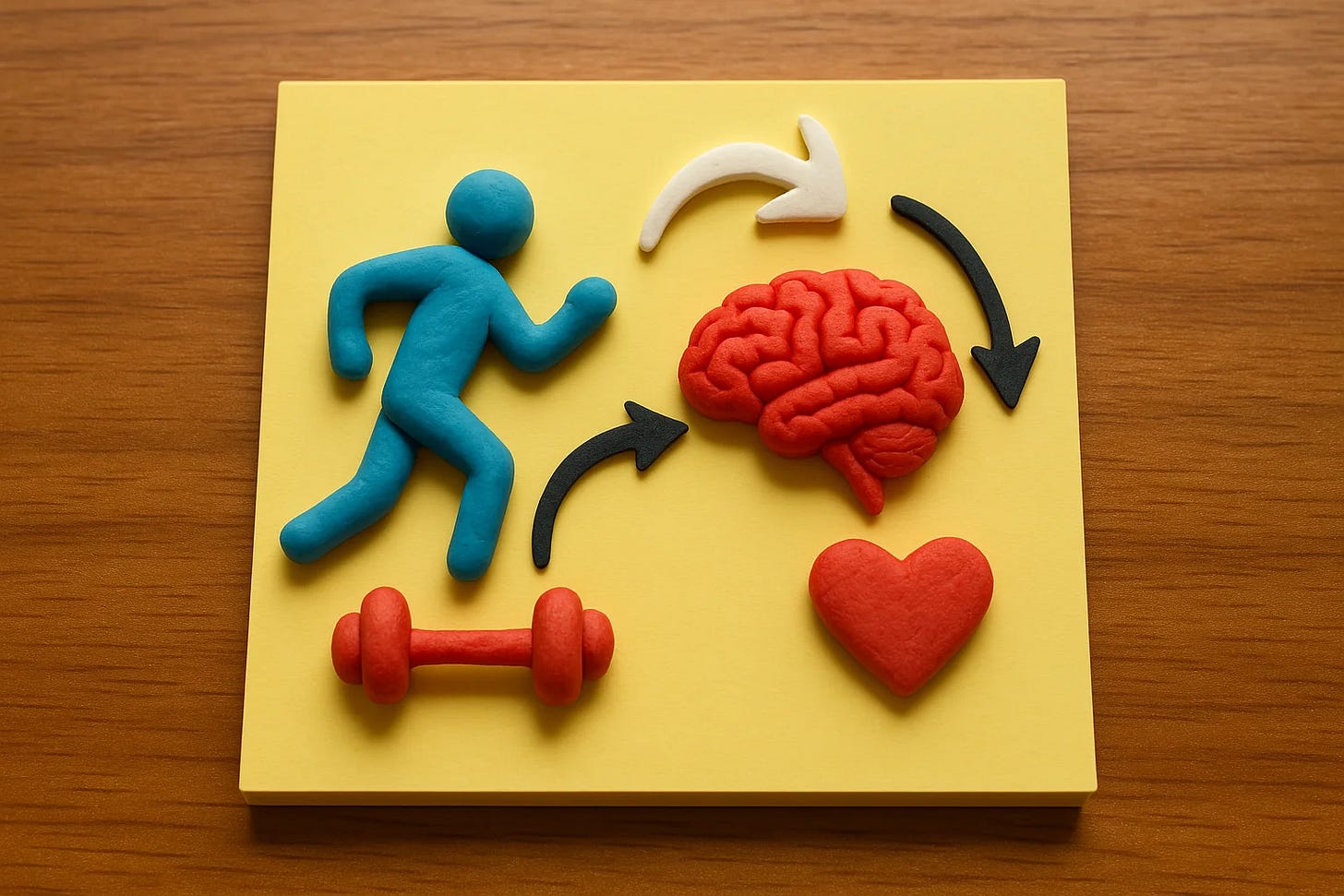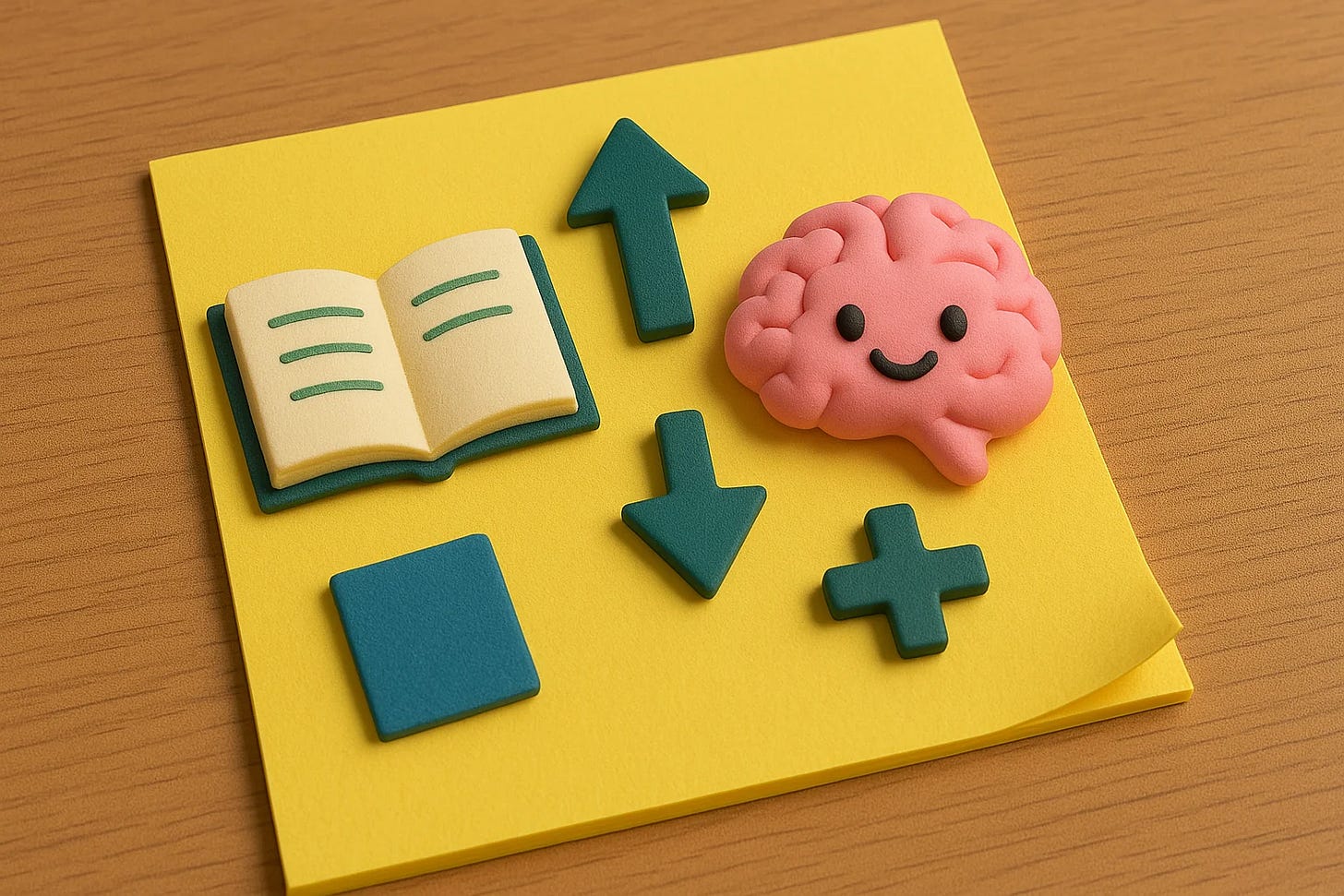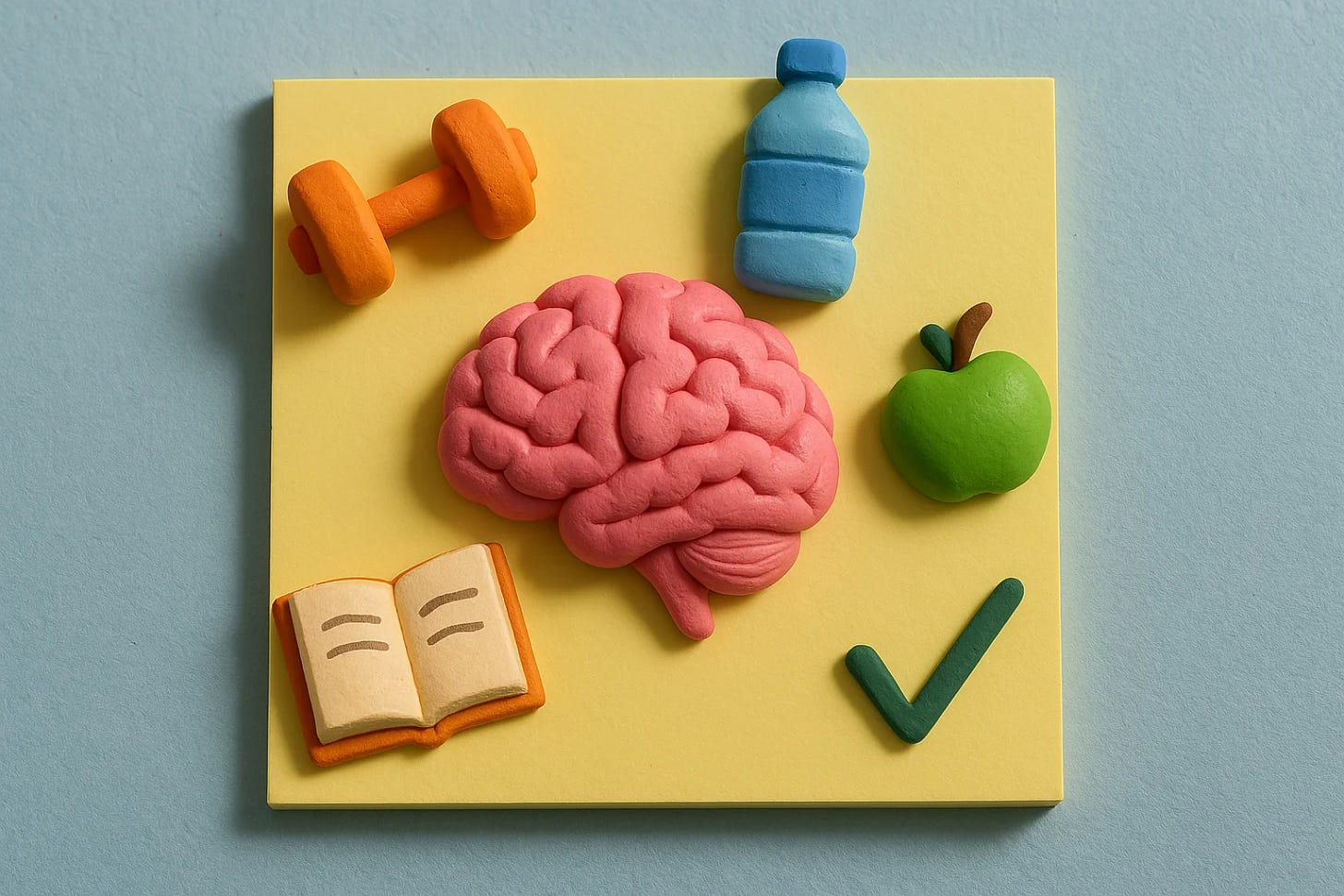Neuro Post-it 8: Brain Health and Longevity
A new series of neuroscientific digestible insights! Written in collaboration with Cesca Centini.
In honour of World Health Day
Our brain is the single most important organ in our body. It would only make sense that, to live a healthier, longer life, there should be greater emphasis placed on educating people about how to enhance brain health and longevity for better cognitive and physiological functioning.
In this edition of Neuro Post-it, we’ll be going over the neuroscience of how our brain stays healthy while also taking a slightly different approach by providing some tips on how to enhance the health of our most important organ.
For the most part, we don’t have to do much voluntarily. The brain is like a self-functioning system capable of taking care of itself, with multiple systems in place to ensure that it’s working 24/7. Here are a few of the components that help it take care of itself:
Cerebrospinal fluid (CSF): this clear fluid (consisting 99% water + some electrolytes) surrounds the brain and spinal cord, acting as a cushion that prevents shock and injury to our delicate nerves. But that’s just the tip of the iceberg. CSF flows between ventricles in the brain and the central canal of the spinal cord to regulate intracranial pressure, transport nutrients and hormones throughout the central nervous system (CNS), and remove waste products from cells. Essentially, think of it as your CNS’ part-time bodyguard, delivery service, and janitor. This rather simple substance really is a jack of all trades.
Blood-brain barrier (BBB): think of this as border control for your brain. More specifically it’s like US border control considering how ridiculously strict it is. But that’s a good thing! The BBB surrounds almost the entirety of the brain (with a few exceptions to allow the brain to monitor blood in specialized areas) and is made of endothelial cells lining brain capillaries that have super tight junctions, allowing only certain substances to pass while discarding others. Important substances for cellular function like oxygen, glucose and some amino acids are able to pass, while toxins and pathogens are prohibited for obvious reasons. Although, there are a few exceptions, as substances like alcohol are able to cross the BBB due to small size and lipid solubility. This is why we get drunk—alcohol can easily pass this barrier and interfere with regular neurotransmitter activity within the brain. But for the most part, this highly selective security system does its job of keeping our brain safe and healthy.
Glial cells: the well-being and functioning of our brain depends on our neurons, so it would make sense for neurons to have caretakers called glial cells (aka neuroglia). What’s nice about glial cells is that they do a lot of the behind-the-scenes work that neurons don’t have to, so that our neurons can remain solely focused on communicating with each other and building/strengthening connections. What are these behind-the-scenes stuff you ask? Produce myelin, regulate homeostasis, remove excess neurotransmitters, provide structural support, secrete growth factors like brain-derived neurotrophic factor (BDNF) to promote neuronal growth and survival, regulate synaptic activity, destroy and remove pathogens to cleanse the extracellular environment, help remodel neuronal circuits in response to learning, modulate inflammation in the CNS, and there’s more but let’s move on. The point is, without these support cells our brain would be so much more susceptible to disease and damage. We can’t thank them enough for looking after our neurons 24/7.
As you can see, the brain is capable of sustaining itself for the most part. But there’s so much we can do ourselves to ensure that this complex yet delicate organ is functioning at its best.
We have outlined a few of the most important things to maximize brain health and longevity below. Take note while reading these, because it can be health—and thus life—changing.
Sleep
The vitality of sleep in brain function and maintaining good brain health can not be possibly overstated.
It’s no joke. This rather small organ that comprises only about 2% of our body weight uses up 20% of our energy, punching way above its weight (literally). And to recharge and maintain proper function, sleeping is the best thing you can do.
Of course there’s this modern-world culture especially in industrialized countries that encourages sleeping less and doing more. Yeah, good luck with that.
Obviously, there are times when we aren’t able to sleep adequately—jet lag, working 24 hour shifts as an on-call doctor, finals week, or when we’re feeling stressed about something in life, to name a few.
But in the grand scheme of things, sleep is not something to neglect. And you’re about to find out why.
The purpose of sleep was actually a mystery for the longest time. It isn’t until recent experiments and access to new technology that we’ve been able to peer into how sleep truly affects brain function and health.
Sleep serves much of a restorative function by ridding the brain of potentially harmful metabolites, as evidenced by this experiment. Here, a group of researchers explored the rate of metabolic waste product removal using state-of-the-art in vivo two-photon imaging to directly compare two arousal states in the same mouse. What they discovered was that metabolic waste products of neural activity were cleared out of the sleeping brain at a faster rate than during wakefulness. This hints toward a cleansing function of sleep.
You know CSF, the jack of all trades fluid we talked about earlier? Turns out its activity differs quite substantially between sleep and wakefulness. Another large group of researchers from across Scandinavia and the US came together and thought, let’s inject some tracers into CSF in the brain of mice and see where the fluid is traced in the brain. Then, we’re going to see how easily we can clear this tracer from CSF during both sleep and awake stages. The researchers discovered that when they put the mice in an unconscious state, a lot more CSF flowed through their brain than when they were awake. How come? Turns out that when the mouse is awake, there’s a lot more pressure in the brain; there’s more space between neurons during sleep (large diameter, less pressure compared to small diameter) making it easier to clear out metabolic waste products.
This is the basis of the glymphatic system, and the same principle applies to human brains.
This principle also explains brain fog; it is more difficult to concentrate after days of sleep deprivation due to the accumulation of metabolic waste products that haven’t been cleared out, which tend to impair neural function as they are toxic to neurons. And why is this? Because the glymphatic system hasn’t been able to clear out these metabolites as efficiently due to the lack of sleep—when most of its activity takes place.
From this research, it is reasonable to conclude that getting adequate sleep is imperative to proper brain function throughout life. And it’s not just about keeping you sharp and alert. After years of sleep deprivation, the metabolic waste products we mentioned can accumulate more and more which can lead to the development of certain neurological disorders.
Don’t sleep on sleep’s restorative function, for it can lead to a more healthy and efficient brain.
Nutrition
It’s common knowledge that the food we eat influences our overall health in more ways than one. And when it comes to the brain, our nutrition can be a huge difference-maker.
Of course, we all love to have food and drinks that taste good—whether that be candy, chips, or coca cola. Obviously though, taste is not the only factor that matters when it comes to what we consume.
The nutrition we get from food often influences our brain function in more ways than we can imagine. Again, the brain uses a whopping 20% of our body’s energy. To feed this greedy organ (albeit for good reason) we need a steady supply of glucose in our blood as this is the fuel its cells run on—like the rest of the body, just a lot more is needed than for cells in other parts of the body. Due to its very high energy demand, the brain is more susceptible to low blood glucose levels compared to other organs. It is for this reason that we often feel mentally exhausted and have difficulty concentrating when our blood glucose drops. Complex carbs like oats and sweet potatoes can help maintain this steady supply of glucose that fuels our brain, keeping us alert and concentrated for long periods of time.
When it comes to producing neurotransmitters, we require a few essential building blocks that primarily come from the food we eat. These include iron and zinc (we primarily get this from food like red meat and lentils), amino acids (mainly from protein-rich foods), and the B vitamins (particularly B-6, B-12, and folate, which are found largely in vegetables and eggs). Considering the role that neurotransmitters like dopamine and serotonin play in aspects of our cognition from mood and attention to motivation and motor control, it makes sense that what we eat plays a big role in how we think, feel, move and act.
For brain development and maintenance, there are a few that stand out in particular:
Omega-3 fatty acids are crucial in building the cell membranes of neurons. We primarily obtain these from eggs and fish.
Antioxidants help fight oxidative stress and inflammation, which can cause widespread damage to neurons over time. These are typically found in fruits (particularly berries), nuts, and some vegetables.
Choline, which we can obtain from eggs, helps in the production of acetylcholine—a neurotransmitter that’s especially important for memory and learning.
As you can see, food isn’t just about filling our stomachs. We have food that makes us smart—literally. Molecules like phosphorus and magnesium boost brainpower, and here’s how:
Phosphorus: a key component of phospholipids in our cell membranes. This molecule not only helps maintain neuronal structure but supports the production of ATP, which powers every neural signal that’s fired.
Magnesium: a conductor of your brain’s orchestra. This molecule calms your nervous system by protecting it from overstimulation, and plays an essential role in neurotransmission while boosting learning and memory.
Our best advice for what nutrition-rich foods to eat to boost neuroplasticity, mood, and reduce your risk of neurodegenerative diseases? Follow the Mediterranean diet.
What not to follow? The American diet. Most definitely not.
Exercise
"Exercise is the most transformative thing that you can do for your brain today."
—Dr. Wendy Suzuki, neuroscience and psychology professor at NYU, from her TED Talk: The brain-changing benefits of exercise
You know those headlines that say movement is linked to reduced risk of Alzheimer’s, Parkinson’s, and other neurodegenerative diseases. They’re true.
Moving on a daily basis, whether it’s hitting the gym, going on a run, or walking 10k steps is imperative to promoting your brain’s health. Remember BDNF we talked about earlier? Your body releases a ton of it when you move. This neurotrophic factor is commonly called the “miracle-gro” for your brain, as it helps with neuronal growth and in building the connections between neurons. What does this do? It significantly boosts learning, your memory and mood.
Exercising also releases pleasurable hormones called endorphins that boost our motivation and mental clarity, which is why we often feel so clear-headed and confident after working out. Endorphins are also natural painkillers that inhibit pain signals and interact with opioid receptors in the brain, helping to reduce stress and anxiety by countering cortisol while also triggering euphoria. This euphoria is best experienced after high-intensity cardio, often known as runner’s high, and can be seen as your brain’s way of rewarding you following a tough workout.
When it comes to aerobic activity like running, swimming and cycling, your brain releases this really cool yet less known chemical called irisin, which protects it from aging and stimulates neurogenesis—the birth of new neurons.
These are just a few of the amazing chemicals released by our brain when we workout, together promoting blood flow to the brain, reducing inflammation, regulating our sleep-wake cycle, supporting memory consolidation, and enhancing learning. There are literally no drawbacks; not a lot of things make you feel so good while promoting your health in so many ways at the same time—but exercise is one of them.
Learning
One of the most efficient ways to keep your brain active is learning. This entails anything from reading a book to learning how to ride a bike to watching The Organic Chemistry Tutor explain how differential equations work for an hour on YouTube. We’ve talked about neuroplasticity here before and in previous editions of Neuro Post-it, but by what mechanism does learning actually improve brain health?
When you learn a new skill, you are physically changing the shape of your brain and its connections. Synaptogenesis occurs—the formation of new synapses—leading to more connections between neurons, stronger communication pathways, and ultimately enhanced memory and processing speed. Also, remember those caretaker cells…neuroglia? They’re pretty damn smart; they adjust their behaviour and increase activity in response to learning to clear waste products and maintain a healthy synaptic environment in areas with an increased number of synapses.
The beauty of the things we’ve covered in this edition of Neuro Post-it is that they’re all connected. Going back to nutrition, diets rich in nutrients evidently promote neurogenesis and synaptic plasticity, which are the bases of learning. Similarly, sleep restores and rebuilds our fading memories, which is why practice with a night of sleep makes perfect. Although, we don’t agree with the perfect part of that statement—because it makes you better, not necessarily perfect.
Point is, acquiring new knowledge and skills is an absolute superpower. It promotes cognitive reserve (more below), can enhance emotional resilience, leads to better focus and memory, and boosts creativity, altogether delaying cognitive decline and increasing the longevity of your brain.
What is this cognitive reserve you talk about?
By engaging in mentally stimulating activities, you can delay the onset of neurological diseases like Alzheimer’s by building a series of alternate networks of neurons that ensures the brain is able to improvise and use alternative ways of doing tasks. This is done by strengthening existing neural networks—meaning that, even if some pathways are affected by changes caused by Alzheimer’s, the brain can reroute tasks through other neural pathways that can maintain cognitive functions for longer periods of time. With an active brain that essentially has more than one way of completing an activity, it will be less susceptible to damage caused by Alzheimer’s and better able to cope with it. Such is the importance of building this cognitive reserve—something that can be done primarily through learning.
It’s simple. Sleep well, eat healthy, exercise on a daily basis, and continue learning no matter what. Not only is it fun and rewarding, but you’re doing your brain and body a huge favour in both the short-run and the long-run. With this Neuro Post-it, we hope that we’ve provided you with the knowledge from a neuroscientific basis that will encourage you to adopt healthier habits—or to continue doing the things you do to keep your brain functioning optimally <3
Save this post-it as a reminder of the key elements to keep your brain healthy :)
Resources and interesting bits:
Lulu Xie et al., Sleep Drives Metabolite Clearance from the Adult Brain. Science 342, 373-377(2013).DOI: 10.1126/science.1241224
Tomas Bohr 1, et al. “The Glymphatic System: Current Understanding and Modeling.” iScience, Elsevier, 20 Aug. 2022, www.sciencedirect.com/science/article/pii/S2589004222012597.
Laura D Gamble, Linda Clare, Carol Opdebeeck, Anthony Martyr, Roy W Jones, Jennifer M Rusted, Claire Pentecost, Jeanette M Thom, Fiona E Matthews, Cognitive reserve and its impact on cognitive and functional abilities, physical activity and quality of life following a diagnosis of dementia: longitudinal findings from the Improving the experience of Dementia and Enhancing Active Life (IDEAL) study, Age and Ageing, Volume 54, Issue 1, January 2025, afae284, https://doi.org/10.1093/ageing/afae284
Co-written beautifully with the marvellous
.










